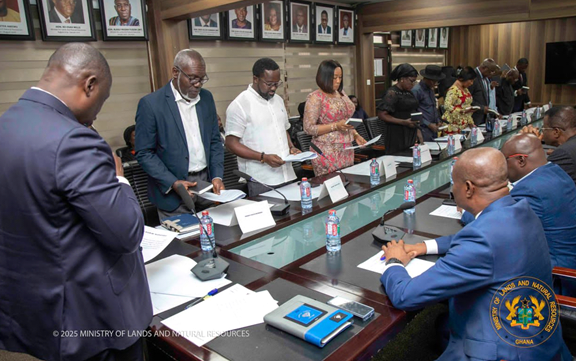A new governing board for the Ghana Integrated Aluminium Development Corporation (GIADEC) has been inaugurated, stepping up efforts to develop its bauxite and aluminium resources as part of a broader push for industrialisation.
The 11-member board, chaired by Kweku Sarfo-Buabeng, was sworn in by Lands and Natural Resources Minister Emmanuel Armah-Kofi Buah, who described the move as a crucial step in realising the country’s long-standing industrial ambitions.
“The aluminium industry holds immense potential to transform our economy, but only if developed responsibly, sustainably and strategically,” Mr. Buah said during the ceremony in Accra.
He called on the board to prioritise value addition by shifting away from the export of raw bauxite and focusing instead on domestic refining and aluminium production.
The minister also urged members to halt unsustainable bauxite haulage practices and align their efforts with Ghana’s green transition goals.
“The aluminium value chain is the key to unlocking Ghana’s industrial future,” Mr. Buah said, highlighting its importance for job creation and inclusive economic growth.
Also speaking at the ceremony, Deputy Minister for Lands and Natural Resources Yussif Sulemana echoed the call for integrity and collaboration, encouraging the board to work transparently under the ministry’s oversight.
In response, Board Chair Sarfo-Buabeng pledged the team’s commitment to delivering results.
“We are ready to position GIADEC as the engine of Ghana’s industrial transformation,” he said, adding that the board will work to build a responsible and sustainable aluminium sector.
The newly constituted board draws from academia, industry and public service, bringing together a range of expertise to steer GIADEC’s ambitious development agenda.
Beyond its leadership reshuffle, it will be recalled that GIADEC has revealed it is drafting a legislative framework to regulate Ghana’s downstream aluminium industry.
This development aims to address rampant cable theft, ensure ethical sourcing and impose standards across an otherwise fragmented sector.
The proposed law, being developed in collaboration with the Ministry of Lands and Natural Resources, seeks to register and certify all downstream operators – including scrap dealers, rod manufacturers and foil producers.
A key measure includes introducing a mandatory certificate of origin for aluminium imports and exports to improve traceability and prevent the circulation of stolen materials.
Currently, the sector operates with minimal regulation – leading to unsafe practices and environmental degradation. Informal smelters, in particular, often rely on crude, polluting methods.
GIADEC says the new framework will help enforce environmental standards, enhance product quality and align Ghana’s industry with global best practices. It is also expected to support sustainable industrial growth and bolster investor confidence.
By establishing clear rules and improving oversight, the country hopes to strengthen its standing in the global aluminium market while ensuring the sector contributes meaningfully to long-term national development.










